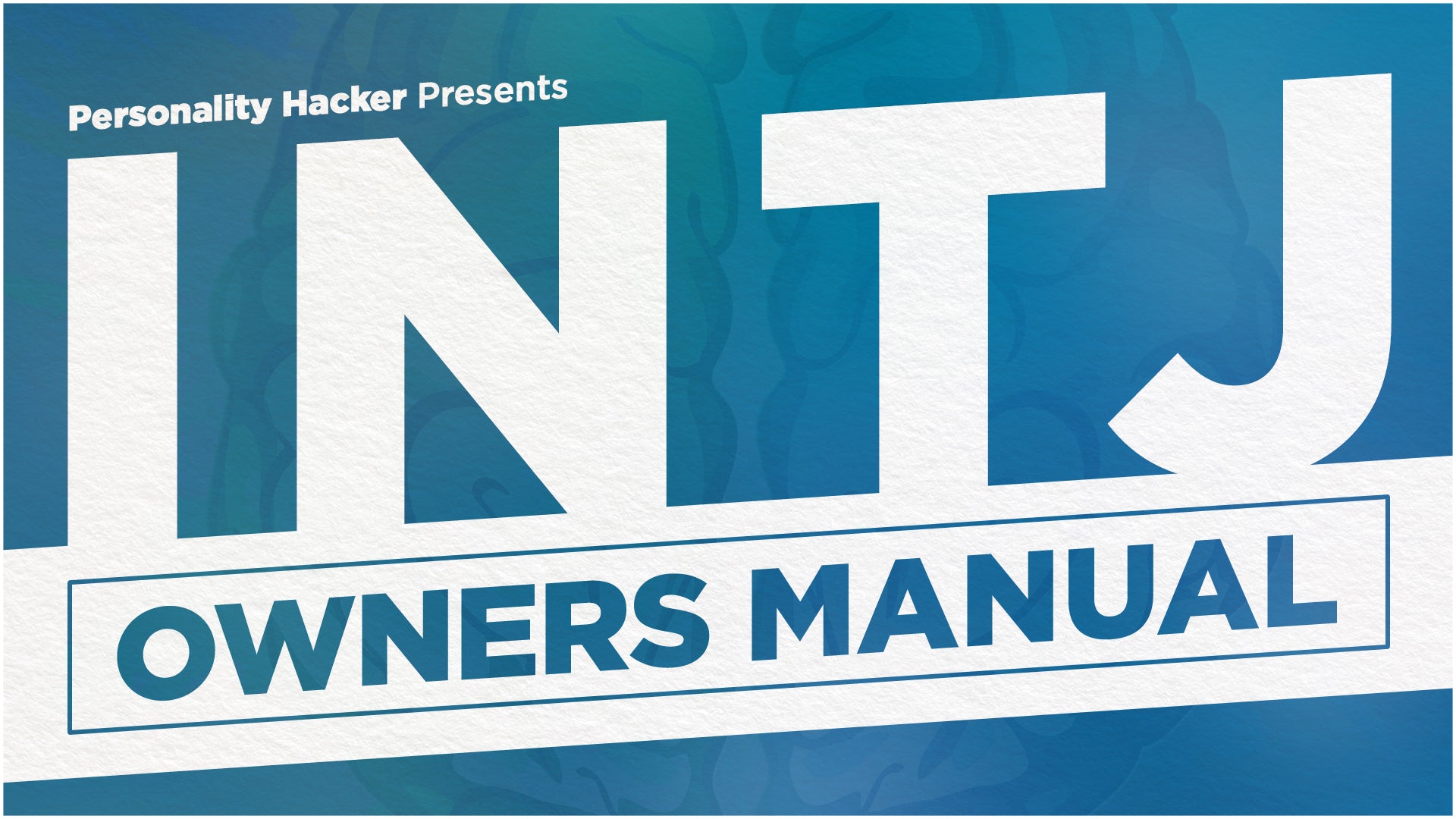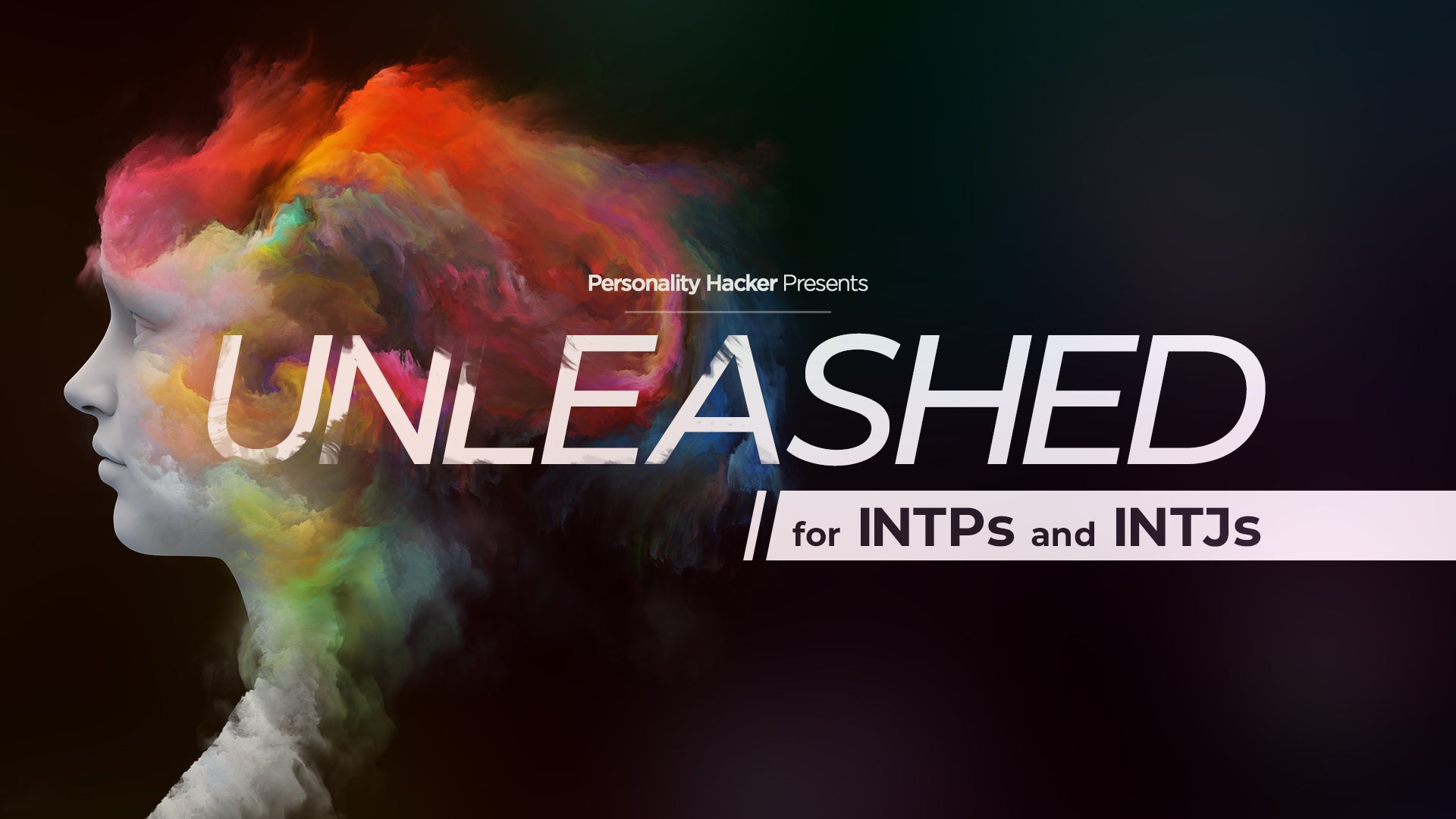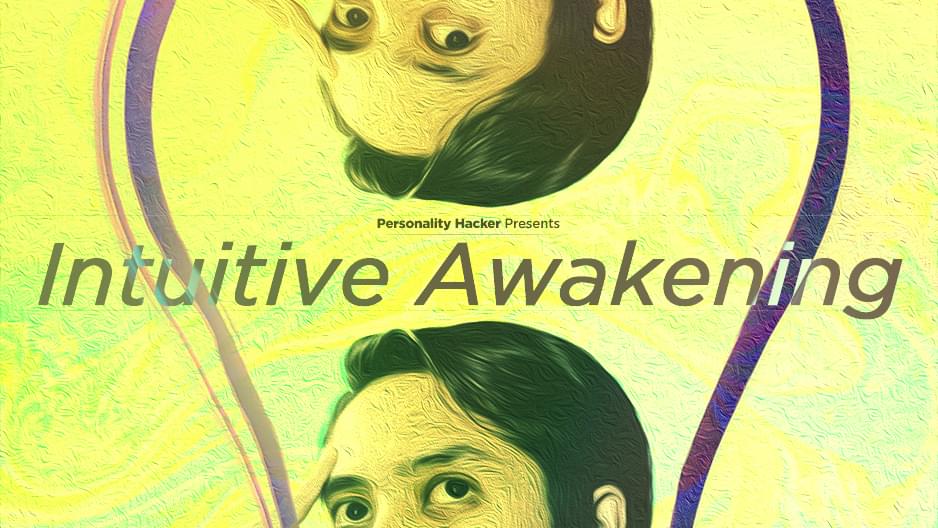The Secret to Loving Yourself as an INTJ Isn’t What You Think…
You’ve been told to “be more vulnerable” or “just accept yourself.”
But what if self-love for INTJs means something entirely different?
What if it’s not about lowering your standards
…but learning to trust the way your mind is actually wired?
Why Typical Self-Love Advice Fails INTJs
If you’ve ever felt like advice about “loving yourself” misses the mark, you’re not alone. You may not even think self-love is a thing. In fact you may think the premise is stupid.
You’ve probably heard things like:
- “Just stop being so hard on yourself.”
- “Learn to go with the flow.”
- “You overthink everything, just feel your feelings!”
These suggestions may sound well-meaning, but for an INTJ, they often feel like a demand to stop being who you are.... and that doesn't feel very self-loving.
True self-love for INTJs doesn’t mean becoming someone else.
It means understanding (and embracing) how your mind actually functions.
Based on Jungian Psychology — Made Practical for INTJs
This article is rooted in the foundational work of Swiss psychologist Carl Jung, who first introduced the theory of Psychological Types. His insights into the different ways people perceive the world and make decisions laid the groundwork for modern personality systems - including the framework you’re about to explore: The 4 mental processes of your INTJ personality.
We’ve taken these timeless principles and translated them into a practical, easy-to-understand guide tailored specifically for INTJs — to help you better understand yourself, grow intentionally, and unlock real self-love from the inside out.
The INTJ Mind — Built for Insight + Execution
Let’s break down the INTJ cognitive wiring using the Personality Hacker “Car Model.” As mentioned, these 4 mental processes come from the work of Psychologist Carl Jung.
In this model, each personality type has four core mental processes... just like the four seats in a car.
Your Driver Mental Process — "Perspectives"
Jung named this mental process Introverted Intuition
Think of "Perspectives" like the captain of a deep-sea submarine... always scanning beneath the surface, tracking currents, and predicting what’s coming long before others even sense it.
This is the INTJ’s way of learning: not by rote or repetition, but through an intricate inner world of forecasting and simulation.
"Perspectives" is slow, deep, and precise. It needs quiet. It needs time. You’re not wired to skim the surface — you dive below, mapping out patterns and projecting outcomes long before others realize there’s a pattern at all.
But in a world that values speed and quick answers, this gift can feel like a liability.
You may feel rushed into action before your insights have fully formed. Without support for your process, the clarity you rely on can begin to fade.
When you don’t honor your need for mental incubation, solitude, and deep contemplation, you lose access to one of your greatest strengths.
But when you do honor your intuition... when you give your mind space to work the way it was designed... something incredible happens: deep certainty emerges. The kind of certainty that builds strategic confidence and personal conviction.
Learning to love yourself as an INTJ starts here: by trusting that your inner process is not a flaw to fix... but a strength to protect.
INTJ "Perspectives" Summary:
- This is how you learn — through pattern recognition, inner simulation, and forecasting the future. It’s slow, deep, and visionary.
- You spend time mentally modeling the future and mapping possibilities before acting.
- You crave clarity and are often driven by an inner “aha” that everything fits together.
- You must have space and solitude to incubate ideas without being rushed.
Your CoPilot Mental Process — "Effectiveness"
Jung named this mental process Extraverted Thinking
Think of "Effectiveness" like the architect of a skyscraper... constantly translating bold blueprints into measurable outcomes, building frameworks that make ideas real.
This is how your INTJ mind should be making decisions: through logic, systems, and outcome-based thinking.
But for many INTJs, this mental process doesn’t get nearly the attention it deserves.
It’s not that you don’t value competence or results... it’s that the path to those results often feels blocked, foggy, or like too much friction is in the way.
Many INTJs bypass their CoPilot because the external world feels chaotic, inefficient, or just... "too dumb" to match their inner thoughts.
Instead of building practical systems, they stay in their heads, endlessly perfecting ideas that never see daylight. They get trapped in a loop of knowing what could work but not taking the uncomfortable, messy action to test it in the real world.
This creates a painful gap in the INTJ... a deep sense of potential that isn’t being fulfilled.
You know you’re capable of more, but the execution doesn’t match the vision. It’s frustrating. You feel stalled, restless, and quietly ashamed that things aren’t moving forward fast enough. But when you do engage this part of your mind (even imperfectly) everything starts to shift.
Systems emerge.
Progress becomes measurable.
Confidence builds.
You stop spinning in abstraction and start watching your ideas take form. Loving yourself as an INTJ means activating this cognitive function... not perfectly, but consistently. It’s not about mastering the external world overnight. It’s about proving to yourself that you can trust your ideas enough to build them, one brick at a time.
INTJ "Effectiveness" Summary:
- This is how you make decisions — through logic, systems, and outcomes. You focus on what works and how to get things done.
- You naturally build step-by-step plans and prioritize amelioration.
- You hold yourself (and others) to high standards of competence.
- When healthy, this process helps translate inner visions into practical results.
Your 10-Yr-Old Mental Process — "Authenticity"
Jung named this mental process Introverted Feeling
Think of "Authenticity" like a young poet sitting quietly in the back seat... softly speaking your truth and whispering what truly matters when the world gets too loud.
This is your internal moral compass... always there... nudging you toward alignment, quietly protesting when something feels off.
You might struggle to articulate your values with words, but you feel them like pressure in your chest... deep, unshakable, and often inconvenient.
For many INTJs, this cognitive function doesn’t show up as a loud declaration of principles, but as a subtle dissonance. You find yourself doing work that’s technically impressive… but somehow misaligned. Making decisions that “should” be right, but don’t feel right. And because that feeling is hard to explain, you push it aside, tell yourself to get over it, and double down on competence.
But the more you ignore this part of you, the more it grows.
A quiet sense of disconnection.
A creeping suspicion that you’re living someone else’s life.
You may start to withdraw from others, not because you dislike them, but because it’s the only way to protect this sacred, uncertain part of yourself.
That’s when perfectionism takes over. You begin thinking, “If I just do it flawlessly, maybe this feeling will go away.”
But it doesn’t. It lingers. Because you’re craving alignment with what matters to you.
Loving yourself as an INTJ means learning to listen to this part of you — even if it doesn’t always make logical sense. It’s not weakness. It’s not inefficiency. It’s the key to emotional sovereignty — and to building a life that actually feels like yours.
INTJ "Authenticity" Summary:
- This is your internal moral compass. It runs quietly but influences how you flavor your actions with your values.
- You may struggle to articulate your values but feel them deeply.
- When under stress, you can retreat into isolation to protect this part of yourself.
- Learning to acknowledge and integrate this process builds emotional resilience.
Your 3-Yr-Old Mental Process: "Sensation"
Jung named this mental process Extraverted Sensing
Think of "Sensation" like a toddler in the back seat suddenly pointing out a beautiful sunset... it’s fleeting, visceral, often overlooked, but a powerful reminder to come back to the present.
This is your access point to the external world in real time.
And for many INTJs, it’s the most neglected part of the psyche. You often feel disconnected from your body... like you’re observing life more than participating in it.
Sensory experiences can feel overwhelming or distracting. You may avoid spontaneity unless you’ve carefully controlled the variables, keeping your world safe, neat, and predictable. But this avoidance has a cost.
Without a strong connection to "Sensation," the body becomes a stranger.
Presence becomes a challenge.
Anxiety builds in the gaps between action and reaction.
You may over-control your environment just to feel safe, missing out on joy, intimacy, and the beauty of the now.
And when this function gets triggered under stress? It can flip the script entirely. Suddenly you’re eating too much, zoning out on screens, making reckless decisions, or shutting down altogether. Your mind — usually so composed — feels hijacked by something raw, impulsive, and out of control.
But when nurtured gently, this mental process can transform your experience. "Sensation" invites you back to your body. It reminds you that life isn’t only about planning the future, it’s also about living it.
Your "Sensation" brings color, vitality, and connection to the present moment.
Loving yourself as an INTJ includes repairing your relationship with this part of you. Not to become impulsive... but to become embodied. To trust that being in the moment isn’t a threat to your vision, it’s the nourishment it needs to thrive.
INTJ "Sensation" Summary:
- This is your access point to the external world in real time. It’s often underdeveloped but holds the key to embodiment and joy.
- You may struggle with being present, spontaneous, or physically grounded.
- When overwhelmed, "Sensation" can trigger stress behaviors like impulsivity or shutdown.
- But when nurtured gently, it brings beauty, vitality, and a reconnection to the moment.
Understanding this “mental car” changes everything... especially when it comes to loving yourself.
Get the INTJ Owner’s Manual → Start Loving Yourself in a Smart Way
6 Ways INTJs Struggle With Self-Love
Without this map, most INTJs experience the same pain points over and over:
1) Constant inner criticism when progress doesn’t match vision
- INTJs can see the mountaintop. They don’t just dream big — they forecast what could be. But when life doesn’t move at the pace or precision of their internal vision, the voice of self-doubt kicks in. “Why isn’t this done yet?” “You should be further along.”
- That critical voice isn’t laziness or pessimism — it’s the mind trying to reconcile the gap between potential and execution. Over time, that gap can create shame. Especially when the INTJ compares their inner standard to external progress and always finds it lacking.
- Your Driver sees what’s possible, but without honoring your timing or structure, you fall into ruthless self-judgment. It’s not that you’re not good enough — it’s that you’re not giving yourself the space to succeed on your terms.
2) Struggle with emotional connection - to themselves and others
- INTJs feel more deeply than most people know — but those feelings don’t always have clear entry points. They value authenticity and alignment, yet emotion often arrives as a confusing, vulnerable wave.
- They might withdraw when they’re overwhelmed, not knowing how to express what they’re experiencing without sounding irrational or “soft.” The result? A loneliness that runs deeper than introversion — a disconnection from their own emotional core and the people who might help them find it.
- When your 10-Year-Old ("Authenticity") is ignored, you start to feel numb. You can’t name your feelings. You lose your “why.” Then wonder why relationships or accomplishments feel hollow.
3) Feeling like others don’t trust your intuition or think it's "too weird" — so you start hiding it
- That slow-brewing knowing INTJs rely on? The world doesn’t always affirm it. Because it isn’t linear. It doesn’t come with receipts. But you trust that deep, slow-brewing clarity — even if you can’t explain it yet.
- But here’s the problem: the world isn’t built for this kind of knowing.
- Your insights don’t arrive in bullet points. They show up as elegant patterns, quiet certainties, or mental simulations that feel obvious to you, but opaque to everyone else. When you speak them aloud, people question you: “Where’s your proof?” “How do you know that?” “Are you sure you’re not overthinking?”
-
And slowly, you stop offering your insights. Not because you doubt them — but because you’re tired of defending them. Over time, you learn to keep quiet until your intuition matches someone else’s logic. You defer. You edit. You shrink. And in doing so, you begin to feel disconnected from your own mental authority. So you stay quiet, even when you’re often right - which damages your self-trust.
4) Over-reliance on competence as the only source of worth
- When clarity and emotional connection feel shaky, INTJs often default to the one thing they know they can do: perform. They become machines of execution — efficient, capable, brilliant. But this becomes a trap.
- Because now their worth is tied to productivity. Any slip — any moment of rest, failure, or uncertainty — becomes a referendum on their value. Over time, this creates emotional exhaustion masked as “drive.”
- Without an active CoPilot ("Effectiveness"), you substitute nonstop “doing” for real clarity. You chase productivity, hoping it will finally give you permission to feel worthy.
5) Burnout from trying to execute everything alone
- Many INTJs pride themselves on self-sufficiency. But when they stop delegating, sharing, or receiving support, it turns into silent martyrdom. They become the lone visionary — overburdened, under-supported, and quietly resentful.
- They assume no one will understand or do it right, so they just carry the weight themselves. The result is isolation masked as independence — and eventually, burnout.
- Because it’s hard to trust others with your vision, you shoulder everything — and pay for it with exhaustion, resentment, and isolation.
6) Shame over the “3-Year-Old” sensitivity to overstimulation or clumsiness
- "Sensation" - the INTJ least certain mental process - can cause unexpected stress reactions. A loud room. A cluttered environment. A loss of physical control.
- These seem like small triggers to others, but for INTJs, they can feel destabilizing. And because they’re so competent in other areas, these sensory “failures” feel shameful. Like, Why can I build a 10-year strategic plan, but I trip walking into the room?
- You might hate how easily you get thrown off by noise, mess, or physical discomfort. But instead of compassion, you respond with shame — cutting off access to joy in the process.
All of this pain compounds. Without understanding how their mind works, INTJs:
- Dismiss insights as unrealistic
- Struggle with action and getting things done effectively
- Emotionally isolate without knowing why
- Live in a mental tug-of-war: too much and not enough
But here’s the truth: you’re not broken. You’re just running a brilliant operating system without the manual.
Once you understand your wiring - how each mental process serves (and sabotages) you — things begin to click...
- The confusion softens.
- The pressure lessens.
And what begins to emerge isn’t just clarity… It’s compassion.
That’s what the INTJ Owner’s Manual was built to deliver.
3 Ways to Love Yourself as an INTJ
Self-love for INTJs isn’t about repeating affirmations in the mirror or forcing yourself to “just accept” where you are.
INTJ self love is about understanding your mind, setting realistic expectations for your growth, and learning to lead yourself from the inside out.
Here’s how:
1) Love Yourself by Trusting Your Intuition — "Perspectives"
INTJs are wired to see what others miss - to track subtle patterns, simulate the future, and recognize elegant solutions long before anyone else has even named the problem.
But too often, you doubt this gift. You hesitate. You shrink your vision to fit other people’s logic. You stop trusting that quiet, persistent “click” of inner knowing.
Loving yourself means reclaiming that vision.
It means giving yourself permission to forecast boldly and think in long arcs, even when the world demands short-term answers. It means learning how to ground your insights in lived experience — so you don’t spiral into abstraction or isolate in your own head.
When you trust your intuition, you stop second-guessing and start acting from clarity. You make decisions not out of fear, but from a place of quiet, strategic confidence.
Steps to Trusting Your Intuition:
- Stop doubting your insights or shrinking your vision
- Expand your mental playground and simulate bold futures
- Ground your pattern recognition in lived experiences
- Learn how to play with abstraction without tunnel vision
- ✅ Result: Deep inner clarity and visionary confidence
2) Love Yourself by Taking Clear Action — "Effectiveness"
You don’t just want ideas... you want traction... progress... movement.
But without structure, your thoughts can get stuck in endless loops of refinement. You know what needs to be done, but you hesitate to start. You want it done right — and that desire for precision can stall you out completely.
Loving yourself means building frameworks that serve you. Not systems that punish you for being imperfect, but systems that liberate you from the burden of carrying everything in your head. It means using real-world data to track progress and give yourself credit. It means releasing perfectionism in favor of meaningful action.
You don’t have to earn your worth through productivity — but when you execute with compassion and purpose, you rediscover your power.
Steps to Take Clear Action:
- Use real-world metrics to validate progress
- Build frameworks to avoid analysis paralysis
- Stop chasing perfection & start executing
- Create realistic systems to translate vision into reality
- ✅ Result: Momentum, discipline, and results you can be proud of
3) Love Yourself by Integrating Emotion & Sensing — "Authenticity & "Sensation"
You feel more than people realize. Your values run deep, but they’re often hard to name. You sense when something is off... but you don’t always know how to fix it. And because your emotional and sensory experiences can feel messy or overwhelming, you might avoid them altogether.
Loving yourself means turning toward these parts of you instead of pushing them away. It means listening to your gut — not to justify every decision, but to understand what matters to you. It means allowing room for uncertainty, for softness, for presence. It means learning to trust your body as much as your mind — to reconnect with the textures of life you’ve been too busy optimizing to notice.
You don’t need to be perfect. You need to be whole.
Steps to Integrate Emotion & Senses:
- Tune into your values without emotional flooding
- Stop outsourcing moral validation and trust yourself
- Reconnect with your body, energy, and the present moment
- Learn how "Sensation" supports imagination (and vice versa)
- ✅ Result: Full-spectrum self-awareness and emergent joy
What’s Actually Going On for INTJs?
Most self-growth advice is made for people who are not INTJs.
INTJs are wired for pattern recognition, mastery, and executing big visions. But the world often misunderstands that wiring and so do you.
Instead of self-love, many INTJs struggle with:
- Harsh inner dialogue and perfectionism
- Emotional disconnection or bottling emotions
- Low energy or burnout from constant pressure & rushing from others
- Endless refinement or second-guessing their plans
- Difficulty translating ideas into consistent action
"You’re not broken. You’re just missing the manual."
Introducing the INTJ Owner’s Manual
A practical, type-specific guide that shows you:
- Step-by-step how your mind works (and how to work with it)
- Where your shadow & blind spots show up — and how to fix them
- How to finally feel aligned, calm, centered, focused, and in control
This isn’t a generic personality report.
This Owners Manual is a detailed, field-tested toolkit designed specifically for how INTJs learn, decide, grow — and love themselves.
Get the INTJ Owner’s Manual → Start Loving Yourself in a Smart Way
The INTJ Owner’s Manual includes:
- The full Personality Car Model explained for INTJs
- Detailed breakdowns of all 4 mental processes - technically called cognitive functions (Perspectives, Effectiveness, Authenticity, Senstation)
- Proper expectations for each process and how to love them
- Growth path to develop your CoPilot ("Effectiveness")
- How to avoid “looping” and “grip” behaviors in your personality
- Flow state triggers and journaling prompts
- Practical tools to increase focus, energy, confidence, and joy
- Plus so much more...









